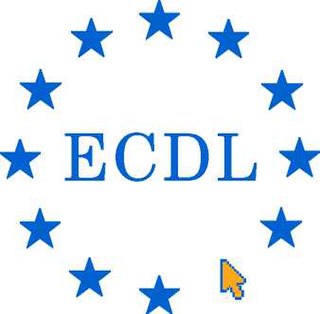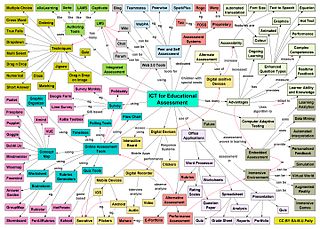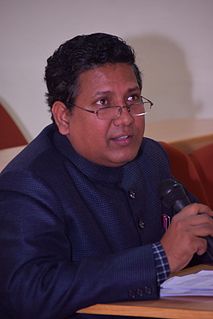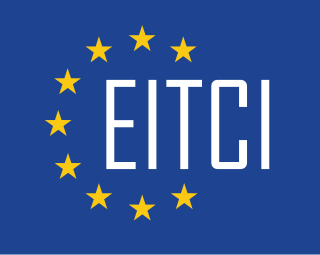Related Research Articles

International Computer Driving Licence (ICDL), formerly known as European Computer Driving Licence (ECDL), is a computer literacy certification program provided by ECDL Foundation, a not-for-profit organisation.

Information and communications technology (ICT) is an extensional term for information technology (IT) that stresses the role of unified communications and the integration of telecommunications and computers, as well as necessary enterprise software, middleware, storage and audiovisual, that enable users to access, store, transmit, understand and manipulate information.
Technological literacy is the ability to use, manage, understand, and assess technology. Technological literacy is related to digital literacy in that when an individual is proficient in using computers and other digital devices to access the Internet, digital literacy gives them the ability to use the Internet to discover, review, evaluate, create, and use information via various digital platforms, such as web browsers, databases, online journals, magazines, newspapers, blogs, and social media sites.

The National Institute of Business Management also known as NIBM, is a public business school based in Colombo, Sri Lanka.
OCR Nationals are vocationally related qualifications which were officially launched by the OCR Board in September 2004. The qualifications are designed to meet the needs of those seeking vocational education in place of the traditional, theory-intensive, academic route. Although the target audience are teenagers (14-19), the qualifications are also suitable for adult learners, much like the GNVQ. The OCR Nationals are being phased out, and replaced by the Cambridge Nationals.
Digital literacy refers to an individual's ability to find, evaluate, and communicate information through typing and other media on various digital platforms. It is evaluated by an individual's grammar, composition, typing skills and ability to produce text, images, audio and designs using technology. The American Library Association (ALA) defines digital literacy as "the ability to use information and communication technologies to find, evaluate, create, and communicate information, requiring both cognitive and technical skills." While digital literacy initially focused on digital skills and stand-alone computers, the advent of the internet and use of social media, has resulted in the shift in some of its focus to mobile devices. Similar to other expanding definitions of literacy that recognise cultural and historical ways of making meaning, digital literacy does not replace traditional forms of literacy, but instead builds upon and expands the skills that form the foundation of traditional forms of literacy. Digital literacy should be considered to be a part of the path to knowledge.
The following outline is provided as an overview of and topical guide to information technology:

The Institute of IT Professionals (IITP) is a non-profit incorporated society in New Zealand. As New Zealand's ICT professional body, the IITP exists to promote education and ensure a high level of professional practice amongst ICT professionals. Before July 2012, IITP was known as the New Zealand Computer Society Inc (NZCS).

This National Conference is the biennial conference of the Australian Council for Computers in Education (ACCE). The conference opens to anyone who in interested in sharing their digital teaching experiences. The first conference took place in Melbourne, 1983. Between 1983-1996, the conference was held annually across Australia. After 1996, the conference became biennial. From 1994, a series of frameworks were launched in Australia to integrate Information and Communication Technology(ICT) into education. Western Australia's 2001 Competency framework for Teachers identified teachers as an important component in developing computer education. In 2010, Education Minister Julia Gillard, proposed an education agenda to provide Australia a better education system. Besides ACCE, there are many organizations and conferences supporting the development of computer education in Australia. Technology in education consists of two major approaches: Learning with technology and learning from technology. Technology in education learning and traditional classroom learning have different focuses and defining features. There are also four types of computer education:Bring your own device(BYOD), blended learning, online learning, and flipped learning.

K M Baharul Islam is presently the Chairperson of Centre of Excellence in Public Policy and Government at Indian Institute of Management Kashipur. He served as the Dean (Academics) during 2019-2021 at the same institute. He was elected as a Fellow of the Royal Asiatic Society of Great Britain and Ireland on 18 March 2020. In October 2021, he was invited as a Visiting Professor at the London School of Economics.
Design for All in the context of information and communications technology (ICT) is the conscious and systematic effort to proactively apply principles, methods and tools to promote universal design in computer-related technologies, including Internet-based technologies, thus avoiding the need for a posteriori adaptations, or specialised design.

The Estonian Information Technology College (EITC) was a private non-profit institution of professional higher education in Estonia, located in Tallinn. EITC provided Estonian applied higher education diploma-level education in information technology in four main programmes, carried out shorter-term vocational training programmes as well as various R&D-oriented activities. In 2017 it merged with the Tallinn University of Technology.
Dhigawa Mandi also known as Dhigawa Jattan is a town located in the Bhiwani district of Haryana, India. It is on the National Highway 14 near Loharu on Delhi Pilani Route.

Quinn Sutton is an American business professional. He is the Executive Director of the Digital Alliance Foundation and is known for his work in the private technology education sector and his work on a variety of UN-related and humanitarian projects. In 2007, he co-founded the Digital Alliance Foundation which provides capacity-building Information and Communications Technologies (ICT) skills to marginalized populations and serves as a High-Level Advisor for the Global Alliance for Information and Communication Technologies and Development (UNGAID).

The European Information Technologies Certification Institute (EITCI) is an international non-profit organisation headquartered in Brussels, Belgium, aimed primarily towards promotion of digital literacy and prevention of digital exclusion, by providing high quality standards for the certification of knowledge and skills in the area of information and communication technologies, in accordance to the European Commission's guidelines.
European Information Technologies Certification Academy (EITCA) programme is an international professional ICT knowledge and skills certification standard, developed and governed by the EITCI Institute – a non-profit organization based in Brussels, that provides certification of individuals' knowledge and skills in broad field-oriented areas of ICT expertise such as Computer graphics, Information security etc. The EITCA programmes, referred to as EITCA Academies, include selected sets of several to over a dozen of individual EITC programmes, that together comprise a particular area of qualifications.

Simon Rogerson is lifetime Professor Emeritus in Computer Ethics at the Centre for Computing and Social Responsibility (CCSR), De Montfort University. He was the founder and editor for 19 volumes of the Journal of Information, Communication and Ethics in Society. He has had two careers; first as a technical software developer and then in academia as reformer. He was the founding Director of CCSR, launching it in 1995 at the first ETHICOMP conference which he conceived and co-directed until 2013. He became Europe's first Professor in Computer Ethics in 1998. His most important research focuses on providing rigorously grounded practical tools and guidance to computing practitioners. For his leadership and research achievements in the computer and information ethics interdisciplinary field he was awarded the fifth IFIP-WG9.2 Namur Award in 2000 and the SIGCAS Making a Difference Award in 2005.
TVET refers to all forms and levels of education and training which provide knowledge and skills related to occupations in various sectors of economic and social life through formal, non-formal and informal learning methods in both school-based and work-based learning contexts. To achieve its aims and purposes, TVET focuses on the learning and mastery of specialized techniques and the scientific principles underlying those techniques, as well as general knowledge, skills and values. TVET is thus recognized as a crucial vehicle for social equity, inclusion and sustainable development.
Educational technology in sub-Saharan Africa refers to the promotion, development and use of information and communication technologies (ICT), m-learning, media, and other technological tools to improve aspects of education in sub-Saharan Africa. Since the 1960s, various information and communication technologies have aroused strong interest in sub-Saharan Africa as a way of increasing access to education, and enhancing its quality and fairness.
References
- ↑ Paraskakis, Iraklis; Hatziapostolou, Thanos (2014). The Elevate Framework for Assessment and Certification Design for Vocational Training in European ICT SMEs (PDF). 6th International Conference on Computer Supported Education (CSEDU 2014).
- ↑ "EITC programme". European Information Technologies Certification Institute (EITCI). 28 November 2014.
- ↑ "ICT training/education and certification". Digital Agenda for Europe, ICT 2013. European Commission.
- ↑ Goetzen, P.; Chmielecki, M.; Hernes, M. (2012). "Egovernment in Poland - Research on Polish Policies and Practices". Journal of Applied Computer Science Methods. 4 (2): 5–20.